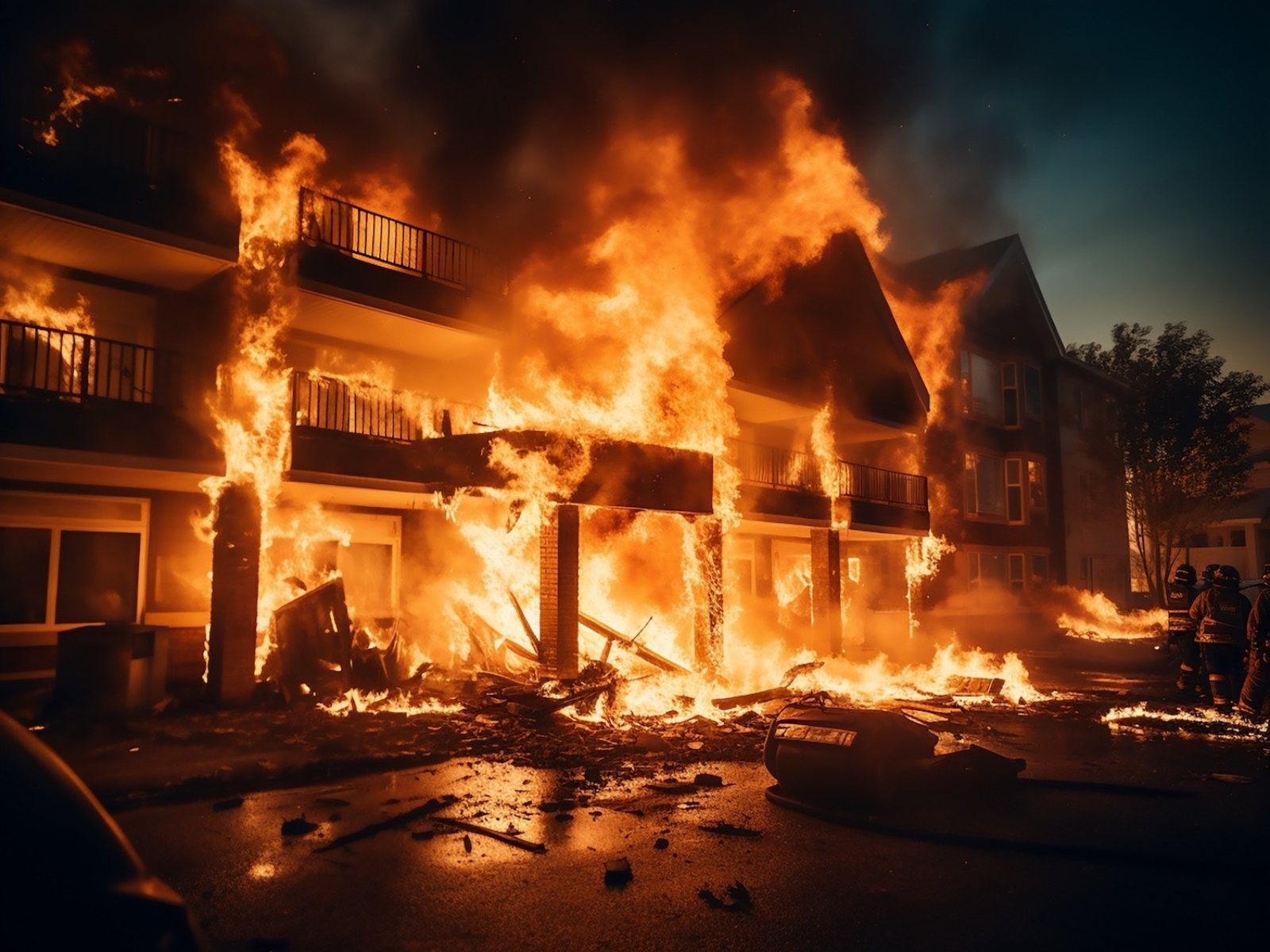What to Do When You’ve Lost Everything in a House Fire

If you’ve found this blog, let us begin by expressing our heartfelt sympathy for the devastating loss you've experienced, and we hope this blog offers you some guidance during this difficult time. The emotional, physical, and financial toll can feel overwhelming, especially when everything you own is just suddenly gone. The loss of personal belongings, cherished memories, and even the sense of safety in your own home can be shattering. Let us stress that while the situation may feel hopeless, recovery is possible. Explore steps you can take to rebuild your life and begin the healing process. In this guide, we’ll cover what to do after a house fire, from immediate actions to long-term recovery, along with tips for coping with the emotional impact and practical strategies to help you move forward.
1. Ensure Safety First
First and foremost, make sure everyone is accounted for and safe. If you are still at the scene of the fire, move to a secure location far from the flames and any potential hazards like smoke inhalation or collapsing structures. Once you are out of immediate danger, call 911 and ensure the fire department has been contacted if they are not already on-site. Fires can reignite even after appearing to be completely extinguished, so it’s important to avoid entering the home until it has been officially cleared as safe by authorities.
2. Contact Your Insurance Company
Once everyone is safe and accounted for, your next step should be to make a call to your homeowners’ or renters’ insurance provider. Report the incident as soon as possible and start the claims process as these things can take time. Once you do this, your insurance company will guide you on what steps to take next, such as arranging for an adjuster to assess the damage. You may be eligible for immediate emergency assistance from your insurance, such as temporary housing, living expenses, or an advance on your claim to cover urgent needs. With your life in chaos, a little financial relief will help.
3. Secure Temporary Housing
If your home is uninhabitable after the fire, securing temporary housing is your next step. Many insurance policies include a “loss of use” provision that will cover hotel stays or temporary rental accommodations while your home is being repaired. Contact your insurance provider to clarify what is covered. If you don’t have insurance or your coverage is insufficient, organizations like the American Red Cross, Salvation Army, or local government agencies may be able to offer assistance with temporary housing.
4. Request a Fire Report
Once the fire department has put out the fire, make sure to request a copy of the fire report. This document contains information such as the cause of the fire, the extent of the damage, and the official account of what happened and can be important for insurance claims and legal matters.
5. Assess the Damage and Document Losses
Before cleaning up or throwing anything away, document the damage thoroughly. As difficult a task as this may be, you will want to do this as soon as you can. You will want to take photos and videos of the affected areas, including any belongings that were damaged or destroyed. This documentation creates a visual record and will be important when filing your insurance claim. This visual record will establish the extent of your losses. Make a detailed list of everything that was lost in the fire, starting with the most valuable or irreplaceable items. If possible, gather receipts, appraisals, or other documentation that may help your insurance company assess the value of your belongings.
6. Prioritize Emotional Recovery
As you busy yourself with the necessity of getting everything done in this list, It’s really easy to lose focus on the emotional impact of fire damage. Losing your home and personal possessions can leave you feeling overwhelmed, anxious, and even traumatized. It’s important to give yourself and your family the space to grieve and process what has happened to you. Many people choose to seek support from a therapist, especially when dealing with feelings of loss, anxiety, or depression, which are common after an experience like this. Organizations like the American Red Cross also offer emotional support services to fire survivors, including counseling and guidance on coping with the aftermath.
7. Recover Important Documents
It’s common for important documents to be lost or destroyed in a house fire. If you can safely retrieve any vital records such as birth certificates, passports, financial statements, or insurance policies, do so. If these documents have been lost, you will need to replace them.
Here are some key documents you may need to replace after a fire:
Driver’s license or state ID: Contact your local Department of Motor Vehicles.
Social Security card: Reach out to the Social Security Administration.
Birth certificate: You can order a replacement from your state or county’s vital records office.
Passport: Contact the U.S. Department of State for instructions on replacing a lost or damaged passport.
Insurance policies: Your insurance company can provide copies of your policies.
8. Plan for Cleanup and Salvage
Make sure your property has been deemed safe to enter before this next step. Once safe, it’s time to start cleaning up and salvaging any items that were not completely destroyed. Before throwing away items, consult with your insurance adjuster to ensure you are not jeopardizing your claim by disposing of items too early. For items that are salvageable, you may need professional help. Fire damage restoration companies specialize in cleaning and restoring homes and belongings that have been damaged by fire, smoke, or water (from firefighting efforts). They can help remove soot, smoke odors, and repair structural damage to your home.
9. Start the Rebuilding Process
If your home has been significantly damaged or destroyed, you will need to start the rebuilding process. Work closely with your insurance company to understand what is covered under your policy and how much you will receive for repairs or rebuilding. You will need to hire contractors, builders, or architects to begin restoring or reconstructing your home.
Make sure you hire reputable contractors who are licensed and insured. Check references and reviews before making a decision. Your insurance company may have recommendations for contractors they’ve worked with in the past, or you can ask for suggestions from friends and family.
10. Explore Financial Assistance and Support Resources
In addition to your insurance coverage, there may be other financial assistance options available to help you recover from a house fire. The Federal Emergency Management Agency (FEMA) provides disaster assistance in some cases, while nonprofit organizations such as the American Red Cross, United Way, and local religious or charitable organizations may offer financial aid or donations to help you get back on your feet. Some banks or lenders may offer hardship programs or deferment options if you are struggling to make mortgage payments due to the fire.
11. Take Steps to Prevent Future Fires
As you rebuild and recover, consider taking steps to reduce the risk of future fires. This may include installing smoke detectors in every room, having fire extinguishers on each level of your home, and creating a fire escape plan for your family. Additionally, if the cause of the fire was preventable (such as an electrical issue or cooking accident), take steps to address these risks.
Losing everything in a house fire is a life-altering experience, but it is possible to rebuild and recover. While the path forward may be challenging, taking the right steps in the aftermath can help you regain control and start moving towards a brighter future. Focus on safety, seek support, and work closely with your insurance provider and other professionals to navigate the recovery process.
All-Clean USA: Trust the Experts When Disaster Strikes
Hire professionals to inspect your home’s wiring or heating systems, and be mindful about fire safety in the future. ALL-CLEAN USA offers the PRIME program designed to minimize property downtime, income loss, and repair costs in the event of a property loss while also providing tools to assess and control property risks, including steps to reduce the risk of future fires. The Emergency Agreement ensures immediate response by dedicated personnel committed to restoring your property quickly, with full staff on-site within 24 hours when damage occurs, and the Emergency Contract is free, providing invaluable peace of mind.
Above all, remember that healing from a house fire takes time—both emotionally and financially. Be patient with yourself and your loved ones as you rebuild your life, one step at a time. Contact us today for immediate assistance. We are here to help!


